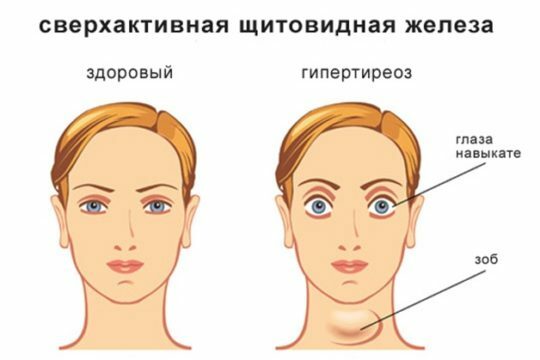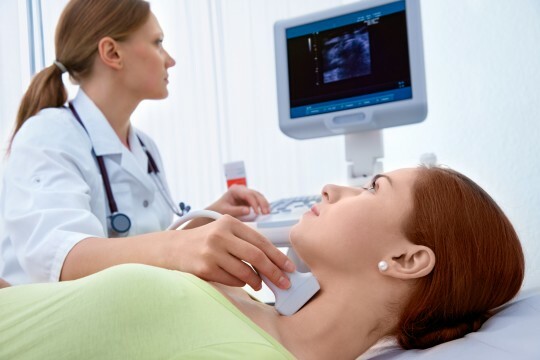The thyroid gland is the most important organ of the human body, which is responsible for the hormonal background and controls the metabolic processes of all substances. The slightest failure in the endocrine system leads to various pathological diseases.

Violation of the hormonal background occurs not only in the adult population, but also in children. Hormones play an important role in the development of a young organism, so early diagnosis of hormonal disorders is extremely important for a child of any age.
Reasons for an increase in the thyroid gland
Thyroid hormones produced by the thyroid gland are responsible for the growth and maturation of all children's organs. In adolescence, a metabolic disorder can have a negative impact on the whole future lifestyle.
Thyroid enlargement in children is the most common endocrine pathology. The main reason provoking organ dysfunction is the lack of iodine in a child. This micronutrient begins to enter the body from the moment when the baby is in the womb. The first years of life are the most important for a child, because during this period there is an active growth of the body.
The following factors are considered to be the main reasons for the increase in thyroid gland:
- Insufficient control of iodine deficiency in areas where the content of this element in water and products is significantly reduced;
- Poor environmental conditions in large industrial cities;
- Hereditary predisposition;
- Improper nutrition of a pregnant woman, as well as a meager diet of a baby.

Congenital manifestation of hypothyroidism is a rather rare phenomenon that has nothing to do with the sex of the baby. If the manifestation of hormonal dysfunction is insignificant, then such a diagnosis does not require medical treatment. The most serious such problem becomes in the age period from 3 to 12 years. According to statistics, an increase in the thyroid gland is most often found in girls of 10 years, so doctors pay close attention to them in terms of endocrinological examination.
The most obvious symptoms of the disease
The development of Based's disease is associated with a violation of the production of the necessary hormones. Moreover, the thyroid gland function can be passive, when hormone production slows down and hypothyroidism develops or, conversely, an active one characterized by hyperthyroidism. The initial stage of the disease has practically no visible symptoms, but in the course of the development of the disease the changes become more pronounced:
- The size of the thyroid gland increases;
- Increased excitability, there is an unreasonable concern;
- The dimensions of some internal organs also differ from the norm;
- Sweating is severe;
- Babies react very sharply to bright lights and loud sounds;
- In the cardiovascular system, palpitations and shortness of breath are observed;
- In children, the appetite decreases, sleep is disturbed;
- There is frequent urge to go to the toilet;
- In adolescence, problems with excess weight may start;
- During the onset of puberty, girls may have problems with the menstrual cycle.
Depending on the degree of the disease, the symptoms manifest themselves in different ways. At the slightest suspicion that the child has augmented the thyroid gland, parents should immediately consult a doctor for the necessary examination.

The stages of development of Graves' disease are divided into six stages. The most dangerous are the last three levels. Increased goiter threatens the child's life, since the hypertrophied organ squeezes the esophagus and larynx. The child becomes not only difficult to pronounce words, but also to eat and breathe.
The most terrible consequence of the doctors believe the probability of formation in the gland of nodular formations, which can later develop into a malignant tumor.
The formation of goiter in a teenager
The peculiarity of the development of the child's organism is that it constantly grows and develops. Naturally, for the correct formation of internal organs, he needs a lot of vitamins and trace elements. Iodine stimulates the production of hormones and takes a direct part in the functioning of the thyroid gland. Insufficient concentration of this microelement leads to the appearance of goitre in children, which is characterized by a visible increase in thyroid gland.
In medicine, this pathological condition has several varieties:
- Goiter without disrupting the normal functioning of the endocrine system;
- Thyroid enlargement accompanied by hypothyroidism and thyrotoxicosis.
- The appearance of goiter is the first symptom of the development of Based's disease and the violation of the hormonal background of the adolescent.
- The degree of enlargement of the thyroid gland has age differences in the norm of volume. For example, for a child of 5-6 years, the norm is considered to be no larger than 5.4 cm( boys) and 4.9 cm
- ( girls).With the onset of adolescence, these indicators change in the direction of increase.

At the present time, goiter is considered an endemic disease characteristic of certain regions where iodine deficiency in water and food is inadequate. The highest percentage of the disease among adolescents is observed in the northern regions of our country. In connection with this phenomenon among the children's population, various preventive measures are being taken to maintain the proper level of this trace element in the child's body.
Different types of childhood goiter
Thyroid enlargement in children and adolescents is divided into several types of medicine:
- euthyroid;
- is endemic;
- diffusive-toxic.
In the etiology of the disease there is also such a thing as congenital goiter. This phenomenon is observed in one baby for 5000 newborns. Pathology is a combination of diffuse goiter with hypothyroidism. In this case girls are under special control. In most cases, this pathology is irregular and is the result of some reasons:
- maternal malnutrition during pregnancy;
- toxic effects on the fetus;
- underdevelopment of the pituitary system of the child;
- consequences of infectious diseases.
The thyroid gland of a child can be increased by the formation of nodes. This phenomenon in medicine is commonly called a diffuse-nodular goiter. In the presence of the second degree of this disease, such a pathology is a serious cosmetic defect.
Diagnosis of the disease
Timely finding out the cause of the disease helps to avoid many negative consequences. In addition, treatment, begun at an early stage of development of hormonal disorder, gives a more effective result.
Diagnosis of the thyroid gland begins with a visual examination of the patient. Invaluable help in establishing the diagnosis is also provided by daily observations of parents on the behavior of the child. If abnormalities are detected, the endocrinologist appoints laboratory tests for the level of hormones in the blood and the content of iodine in the body. For additional control by a physician, an ultrasound examination of the organ may be prescribed. In some cases, a biopsy is done.
Based on the results of the conducted studies, the doctor establishes the diagnosis and the possible cause, which affected the failure of the endocrine system.
Tactics of treatment
In the treatment of thyroid dysfunction in children, various medicamental tactics are used. The doctor selects the drugs for each child individually, so it's pointless to talk about a classic set of medications.
In the fifth and sixth stages of the disease the problem is solved most often with the help of surgical intervention, after which a long restorative hormone therapy is prescribed.
When diagnosing hyperthyroidism, an endocrinologist prescribes drugs that depress excessive production of hormones.
Regardless of the depth of the problem, any treatment should be carried out against a background of dietary nutrition, including in the diet of iodine-containing products.




